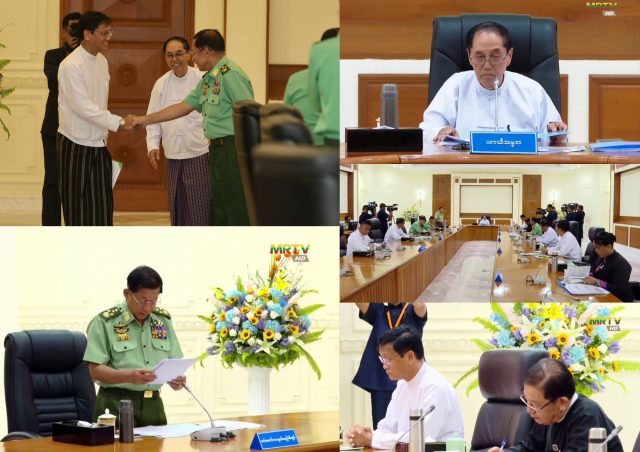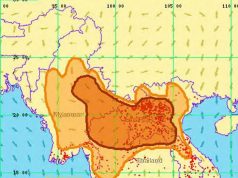In a recent meeting held on 31 July 2023, the National Defence and Security Council of the Republic of the Union of Myanmar announced the extension of the State of Emergency for an additional six months, starting from 1 August 2023. The decision comes as the country faces ongoing security challenges and seeks to ensure peace, stability, and socio-economic development.
During the meeting, Commander-in-Chief of Defence Services, Senior General Min Aung Hlaing, highlighted the efforts of the State Administration Council in fulfilling its responsibilities in accordance with the Five-Point Road Map and 12 Objectives. However, he also reported concerning incidents of violence perpetrated by various armed groups.
From 1 February to 31 July 2023, the nation witnessed attacks by the National Unity Government (NUG), People’s Defence Force (PDF), and some Ethnic Armed Organizations (EAOs), resulting in the loss of lives of four members of the Sangha and nuns, 772 innocent civilians, and 28 State service personnel. These attacks also led to the destruction of multiple buildings, including 11 religious structures, one health-related building, 76 public buildings, 94 roads, bridges, and tollgate facilities, along with 26 telecom towers.
The government’s efforts to promote education faced opposition from terrorists who targeted the education sector through acts of terror. Furthermore, these groups carried out 94 incidents of blowing up roads and bridges, causing significant disruptions to transportation.
Security forces have been countering these acts of terror in specific regions, including Sagaing, Magway, Bago, and Taninthayi regions, Kayah, Kayin, Chin, and Mon states, where terrorist groups have been using civilian populations as human shields.
The government also seized a substantial number of weapons from these groups, amounting to 18,792 assorted guns, 1,423,224 rounds of ammunition, and 45,865 units of ammunition from 1 February 2021 to 30 July 2023.
Despite the challenges, the government has managed to steer the country’s economy towards a positive trajectory. It secured a GDP growth of 3.4% in the 2022-23 financial year and aims to achieve 4% GDP growth in the 2023-24 financial year through concerted efforts.
In the context of the forthcoming election, 35 political parties have been allowed to stand as registered political parties until 27 July 2023. However, certain areas face security concerns due to terror acts and unlawful movements, making it vital to ensure a peaceful and stable environment for voters to cast their votes without fear or dependence.
Peace talks have been held with several EAOs in pursuit of nationwide enduring peace. The government has expressed its commitment to continue the dialogue and invites all ethnic armed organizations to engage in the peace process.
In light of these circumstances, the National Defence and Security Council, with the support of Vice-President U Henry Van Thio and Speaker of Pyithu Hluttaw U T Khun Myat decided to extend the State of Emergency for six months under Section 425 of the Constitution. The extension aims to provide the necessary time to address security concerns, ensure accurate voter lists, and create a secure environment for the upcoming general election.
The Pro Tem President, U Myint Swe, declared the extension of the State of Emergency in the entire nation and emphasized the importance of ensuring a free and fair election process for the welfare of the people and the nation’s democratic future.
The situation remains delicate as Myanmar continues to grapple with security challenges, but the government’s commitment to peace, stability, and socio-economic development remains unwavering. Cooperation from all stakeholders, both local and international, will be crucial in realizing Myanmar’s aspirations for a genuine and disciplined multiparty democratic system.










